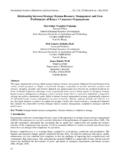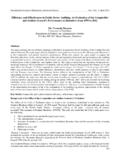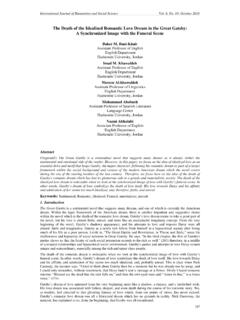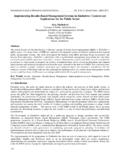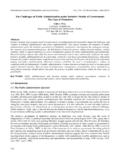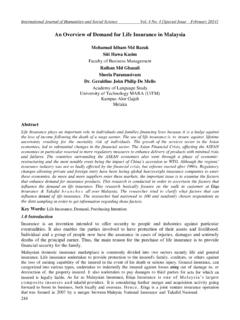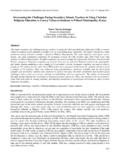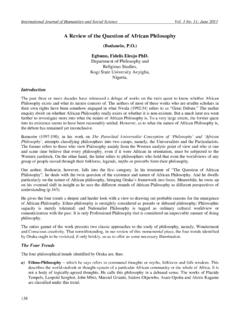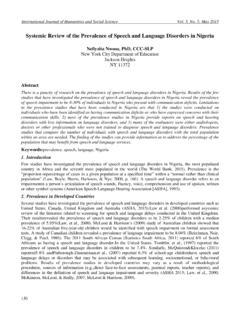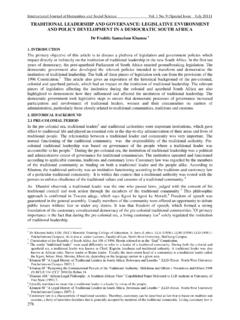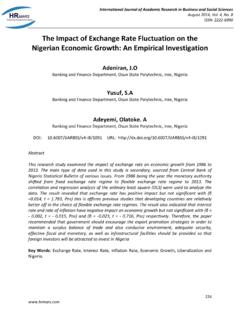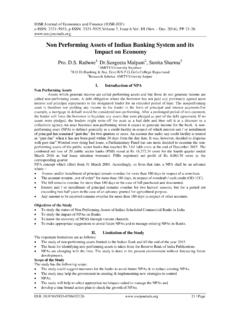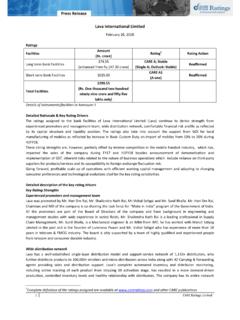Transcription of Impact of Capital Flight on Exchage Rate and …
1 International Journal of Humanities and Social Science Vol. 2 No. 13; July 2012 247 Impact of Capital Flight on Exchage Rate and Economic Growth in Nigeria Saheed, Zakaree S., PhD Ayodeji, S. Department of Economics and Management Sciences Faculty of Arts and Social Sciences Nigerian Defence Academy Kaduna, Kaduna State, Nigeria. Abstract Capital Flight has been a source of major concern in developing countries, especially in Africa, where there is shortage of Capital essential for development. Capital Flight from resource starved countries to economically advanced countries is viewed as a diversion of domestic savings away from financing domestic real investment and in favor of foreign financial investment.
2 Consequently, the pace of growth and development of the economy is retarded. More so, since it involves transferring Capital to foreign countries, it encourages increasing demand for foreign currency, especially dollar, which tends to exert pressure on exchange objective of this paper is to examine the Impact of Capital Flight on exchange rate and economic growth in Nigeria, using OLS method to analyse the secondary data obtained through the Central Bank of Nigeria, National Bureau of Statistics and other sources. The findings indicate that Capital Flight has a positive and statistically significant Impact on the exchange rate in Nigeria, and in contrast to previous work, Capital Flight has a positive effect on economic growth in Nigeria.
3 Based on the findings, recommendations were made on how to check the menace of Capital Flight in developing countries, especially Nigeria. Among such recommendations is the need for further training for the Nigerian customs so as to improve their effectiveness in tackling cases of misinvoices in import and exports. Key Words: Capital Flight , Economic growth, Exchange rate, Investment and foreign Background Information The speed and magnitude of Capital Flight tend to hold that the causative factors of Capital Flight are not purely economic, but a correspondence between political decisions and the economic environment, just like the definition holds an element of political sentiment.
4 For instance, according to Ajayi (1997), Capital shift out of developed countries is regarded as Capital outflows, because the investors from developed countries are responding to investment opportunities while those from developing countries are said to be escaping the huge risks perceived at home, hence regarded as Capital Flight . In whichever way it is viewed, Capital Flight takes place through transferring a part of domestic private savings abroad, the persistence of which can lead to a serious decline in domestic savings and when this occurs, banks domestic resources in form of savings fall, curtailing the bank s ability to provide credit. The Impact of this is staggering, especially for Africa, as it drains foreign reserves, heightens inflation, reduces tax collection, cancels investment and undermines free trade (Global Financial Integrity, 2010).
5 Besides removing resources that could otherwise be used for poverty alleviation and economic growth, it tends to restrict the capacity and ability of affected countries to mobilize domestic resources and access foreign Capital necessary to finance economic growth and development. Consequently, Capital Flight contributes to the retardation of economic growth and development of developing countries. According to Ndikumana and Boyce (1998;2001), the Capital Flight from Zaire (Congo DR) between 1968 and 1980 was estimated atUSD12 billion, and the amount of Capital flightfrom 25 low-income African countries within the sub-Saharan region for 1970 to 1996, after adjusted for trade misinvoincing, is estimated at USD193 billion.
6 The Global Financial Integrity (2010), in its study which covers 1970-2008, estimated the volume of illicit flows out of Africa to be closer to trillion. Centre for Promoting Ideas, USA 248 Capital Flight from seven sub-Saharan African countries namely; Nigeria, Ghana, Congo, Zaire, and Zambia from 1970 to 1992 was estimated at 91, 58, 35, and 32 percent of external borrowing, respectively (Nyatepe-Coo, 1994). To her, this study linked the results to the unreliability of the governments actions, macroeconomic volatility and political flux. Capital Flight in Nigeria is more severe than it is elsewhere in other Sub-Saharan Africa countries.
7 Although reliable and comprehensive data does not exist on the magnitude of Capital Flight from countries of low-income Africa, but it is believed that Capital Flight particularly from Nigeria has been substantial (Ajadi, 2008). The political instability, labor strife (conflict) and corruption in the Nigeria economy have increased the intensity of Capital Flight with the occurrence of 1985 military coup, which brought General Ibrahim Babangida to power, 1987 coup, and 1991 attempted coup against President Babangida and more. Capital Flight in Nigeria became more pronounced between 1976 and 1991 during which it accounts for an average of about of the GDP (Gross Domestic Product), and the trend has been on increase ever since then.
8 Between 1981 and 1990, Capital Flight from Nigeria has increased by more than percent as compare to the economic growth of just percent within the period of observation. Within the next one decade (1990 and 1999), the percentage increase in Capital Flight and economic growth is estimated at 1, percent and percent respectively, Then between 1999 and 2007, the rate of increase in Capital Flight tend to be on decrease, as it increase by only percent compare to previous decade, while the economy also grew by only percent compare to the previous decade. According to the Vanguard Newspaper (2010), the trend of Capital Flight in Nigeria was more noticeable between September and November 2009 when several billions of US Dollars was purchased through the banks and bureax-de-change.
9 Within the period, a total of billion (N2, billion) went out of the country. In 2010, by the records available at the Central Bank of Nigeria, between January 22, 2010 and March 5, 2010, a total of billion (N1, billion) went out of the country. The fundamental economic concern about Capital Flight is its tendency to reduce welfare in the sense that it leads to a net loss in the total real resources available to an economy for investment and growth. That is, Capital Flight is viewed as a diversion of domestic savings away from financing domestic real investment and in favor of foreign financial investment. As a result, the pace of growth and development of the economy is retarded from what it otherwise would have been(Deppler and Williamson, 1987).
10 Hence, on one hand, Capital Flight is considered to slow down the pace of economic growth. On the other hand, however, during 2000-2008, when Sub-Sahara Africa enjoyed its strongest period of sustained economic growth, the pace of illicit flows from the region also accelerated relative to previous decades. The acceleration could be connected to an increased opportunities to misinvoice trade that typically accompany increasing trade volume (Global Finance Integrity, 2010). More so, Capital Flight encourages increasing demand for foreign currency, which tends to exert pressure on exchange rate, thereby increasing the rate, particularly Naira against Dollar.
